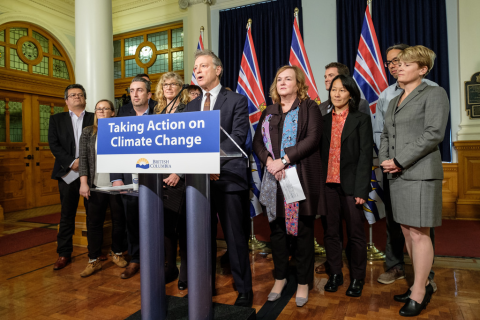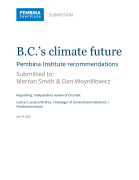B.C.'s Climate Solutions and Clean Growth Advisory Council sent the following letter to Minister of Environment and Climate Change Strategy George Heyman. (Karen Tam Wu, acting B.C. director at the Pembina Institute, is a member of the council.)
April 25, 2018
The Honourable George Heyman
Minister of Environment and Climate Change Strategy
Province of British Columbia
Legislative Buildings
Victoria, British Columbia V8W 9E2
Dear Minister Heyman,
Thank you for the opportunity to contribute to British Columbia’s actions on climate change and clean growth. Given the critical importance of these issues, we are honoured to advise you and your government.
We welcome the government’s commitment to release a Climate Solutions and Clean Growth Strategy in fall 2018. In our view, this strategy should signal a steady, committed and iterative approach to climate action that consistently drives down emissions and increases economic opportunities for all British Columbians, while strengthening community and household resilience.
The Climate Solutions and Clean Growth Strategy should be as much an economic plan as an environmental plan. It must cut carbon pollution, while at the same time enabling low-carbon innovation and supporting just transitions for workers and communities. The Climate Solutions and Clean Growth Strategy should clearly signal that British Columbia is open for business in the low-carbon economy as a competitive and leading jurisdiction for investors.
The Climate Solutions and Clean Growth Advisory Council (the Council) supports the government’s carbon tax increase which provides an incentive to invest in clean energy and promotes clean growth while providing resources to support household affordability. We also support the steps government is taking towards competitiveness for the industrial sector.
We recommend the Climate Solutions and Clean Growth Strategy be integrated with other developing provincial strategies, particularly the energy roadmap and the economic development strategy. We feel that creating a single integrated strategy, as other jurisdictions have successfully done, will best position British Columbia for long-term success.
Our Principles
Since being formed, the Council has been focused on providing a foundation for the work ahead.
We have identified a set of principles to guide our work. Our advice will respect Indigenous perspectives and the goal of reconciliation, and will be designed with the following principles in mind:
- Demonstrating Ambitious Leadership
- Ensuring Credible, Durable, and Cost-Effective Policies
- Creating Prosperity and Jobs
- Supporting a Just Transition
- Enabling Industry Competitiveness
- Increasing Community Resilience
- Respecting Diversity and Ensuring Equity
- Committing to Meaningful Engagement
We include additional detail on these principles in the attachment.
The Council is aware of the debate surrounding industrial projects. In our Principles, the Council emphasizes the importance of an integrated, balanced and ambitious approach that reconciles credible and effective climate action that delivers significant emission reductions in line with targets, and the active pursuit of economic development across British Columbia that includes industrial projects.
The Climate Solutions and Clean Growth Strategy
The Council understands that the government’s Climate Solutions and Clean Growth Strategy will include a vision for climate action and clean growth, updated legislated targets, and certain foundational actions and sectoral plans for transportation; buildings and communities; and industry to meet the sectoral targets.
Government has proposed a workplan that is structured, measured and deliberate which we support. It is important that government move forward with concrete actions that set us on a path towards our targets and demonstrates sincerity and credibility regarding our collective commitment to meeting these targets. We recognize the context within which the strategy is implemented will change over time. The constraints and opportunities that will present themselves in future decades cannot be easily predicted. Plans will evolve over time and will need to be evaluated and updated on a regular basis.
As you develop the Climate Solutions and Clean Growth Strategy, we recommend the following as it relates to reduction targets.
Updated Reduction Targets
Greenhouse gas (GHG) reduction targets drive governments to reduce carbon and create goal-oriented climate action policies. We know British Columbia will not meet its existing 2020 target. However, the province can meet its target to reduce emissions by 80 per cent below 2007 levels by 2050. We must reach this long-range target and do our part to keep global warming well below two degrees.
To help achieve the 2050 target, we support government’s intention to repeal the 2020 target and your proposal to introduce a new legislated target of reducing emissions by 40 per cent below 2007 levels by 2030. In addition, we recommend government establish and legislate a 2040 target. We also recommend government adopt targets for 2025 and 2035, to help ensure that we are on track for the 2030 and 2040 targets.
We also support your commitment to implement sector-specific targets for three sectors: transportation; industry; and, buildings and communities. These targets help focus efforts on early action to change the existing GHG emissions curve. There is already a substantial body of work and consultation that has been undertaken on targets, including a recommendation from the 2015 Climate Leadership Team. In light of this, we recommend you update the sectoral targets previously recommended by the Climate Leadership Team. We support targets that are the most cost effective option with the information available on technologies and trends at this time. We understand this is a 30 percent reduction by 2030 for industry, 30 percent for transportation, and a 60 percent reduction for buildings and communities.
We understand government will consult on these matters and we will provide additional advice after the consultation has been completed.
2015 Climate Leadership Team Recommendations
Further to your request, we have reviewed the 2015 Climate Leadership Team’s recommendations and have prioritized the following as input to the upcoming sectoral plans:
Low Carbon Fuel Standard: The transportation sector produces approximately 39 per cent of British Columbia’s total greenhouse gas emissions. We can significantly reduce emissions in this sector via British Columbia’s existing Renewable and Low Carbon Fuel Standard. The Government of Canada has also begun consultations to develop a Clean Fuel Standard that can reduce Canada’s carbon emissions by increasing the use of lower carbon fuels, energy sources, and technologies. British Columbia’s Renewable and Low Carbon Fuel Standard requires a 10 per cent reduction in the average carbon intensity of transportation fuels by 2020 and we recommend investigating the strengthening of the fuel standard beyond 2020.
Zero Emissions Vehicles (ZEVs): In 2015, British Columbia joined 13 other jurisdictions under the International ZEV Alliance, which is working to ensure all new passenger vehicles will produce zero emissions by the year 2050. Many jurisdictions have already taken action to get there. We support government’s commitment and advise that British Columbia’s Climate Solutions and Clean Growth Strategy will need to define clear actions to reach this goal in keeping with our Principles.
Building Emissions: Buildings contribute approximately 11 per cent of British Columbia’s greenhouse gas emissions. Existing buildings present a considerable challenge to reaching our emissions reduction goals, as they will continue to stand beyond our 2050 reduction target. We recommend the province adopt a suite of policies to target new and existing buildings.
Incentivizing Clean Growth and Addressing Competitiveness: Industrial sectors provide well-paying jobs for thousands of British Columbians and produce approximately 39 per cent of our province’s carbon emissions. We support government’s proposed clean growth incentive program, which would set a global standard as a basis for redirecting incremental carbon pricing revenue back into the industrial sector and also providing resources to all industries to continue to improve technology and reduce emissions. We look forward to the opportunity to provide further advice on the development of the program and other potential solutions to ensure concerns for industry competitiveness are adequately addressed.
Engagement and Communications
Engaging British Columbians in the opportunities presented by the new Climate Solutions and Clean Growth Strategy will be central to its success. We urge the government to demonstrate steady, committed leadership on this file, both as the Climate Solutions and Clean Growth Strategy takes shape and as it is implemented. Clear, inspiring communication that articulates the future opportunity, the progress being achieved and the meaningful role British Columbians can play in the transition to a clean economy will create positive momentum and durable change.
Next Steps
As they are developed, the Council will consider sectoral plans on transportation, buildings and communities, and industry, as well as the opportunities and challenges of clean growth, and will provide further advice to you.
We also look forward to providing advice on the Climate Solutions and Clean Growth Strategy and the supporting actions as we continue to work with you on this challenging and incredibly important task.
Sincerely,
The Climate Solutions and Clean Growth Advisory Council








